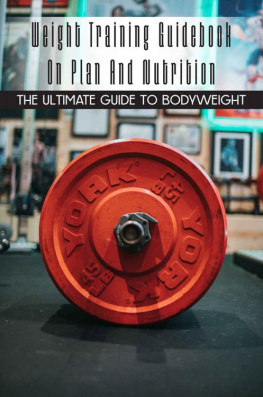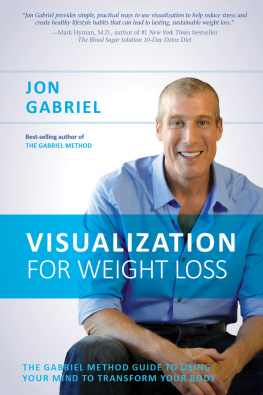
Praisefor Run Your Butt Off!
I used to hate to run. I hated it just like most of the kids in gym class. Running the mile felt like an eternity. If you would have told me then that one day I would run in the Olympic marathon and be running 15 to 20 miles a day in training and loving every minute of it, I would have laughed. The most difficult step that all of us take in running is the first step, whether it's the first step of beginning training or the first step of a marathon race. One of the keys to getting through that first step of training is to break running down into manageable bite-size pieces, which is exactly what Run Your Butt Off! has done. This method of training will lead to bigger and bigger breakthroughs in your fitness until one day you might find yourself at the finish of a marathon.
Ryan Hall, Olympian and American record holder in the half-marathon
If you want to be more healthy and fit, Run Your Butt Off! is the book for you. It will teach you how to make smarter food choices, and it provides an easy-to-follow program that can turn anyone into a runner. Run Your Butt Off! is the guide for anyone who wants a healthier lifestyle.
Rebecca Lobo, Olympic gold medalist and former WNBA player
I have traveled all over the world. I need to exercise to stay fit for my business. Running has been something I have done from Sweden to Thailand. It's a great way to get out and explore this wonderful world we live in. When you can move and breathe in fresh air while looking at your surroundings during running, you feel strong, powerful, and that all is well. Problems are solved or diminish.
This book is for people who want to start exercising and do the right thing but don't know how to safely and correctly begin. I started to run at 21, and eight marathons and 30 years later, I can tell you RUNNING IS A GOOD THING! It helps you feel good about yourself both inside and out. So, read this book and then just put one foot in front of the other. And experience our runners high.
Kim Alexis, supermodel


Contents
Foreword
At the 2010 Chicago Marathon expo, a pair of husband-and-wife runners stop by to introduce themselves. We're chatting, and they appear to be any two middle-aged runners, excited for the race the next day. But as their story unfolds, it slowly dawns on me that I'm seeing a shadow of their former selves. The wife got started running first, and she tells me she has lost 150 pounds.
Say what? One hundred fifty pounds? Can that be? I'm looking at her, trying to imagine what she must have looked like almost double the size. Then the husband chimes in. Motivated by his wife's success, he started running, and now his weight is down 100 pounds. That's more than 250 pounds, poof, gone, from one couple. They're proud of themselves, thankful for their newfound health, thrilled with how far they've come, and a little giddy at the possibilities out there for them.
As they should be. I hear stories like that more and more these days. With Runner's World, I travel to a lot of races. And these days if there are 50 people at a gathering, it seems at least six will have an incredible weight-loss story. These are folks who tell us they weighed north of 300 pounds a few years ago, before they decided to make a change. They cut back on their calories and started walking on the treadmill. Then the story lines start to sound pretty similar: After a couple of weeks of consistent walking, they break into a jog. Then they push a little longer, running 1 mile, 2 miles, 3. Sometimes they get to the half-marathonor, in the case of the Chicago couple, the marathon. No matter the distance, they discover more of a life for themselves than they ever thought they'd have.
I'm a competitive runner, and I'll always love the excellence of the elites who run marathons in a little over 2 hours, sustaining what seems like impossible speeds over grueling distances. But maybe I've softened a little in the decades since I won the 1968 Boston Marathon. These days, the stories of people changing their lives through running, losing a lot of weight, and improving their health and fitness touch me so much more. Here are people who, with running, have a whole new outlook. They feel like running has given them a second chance. They'll live to see their grandchildren prosper. These stories get me right in the heart.
All weight-loss experts agree that calorie cutting is the first order of business when you need to shed pounds. Eat less and you'll lose weight. But the long-term route to losing weight is trimming the diet and adding consistent aerobic exercise to keep the pounds off. And for that, running is the best. It's simply the most efficient way to burn calories in the least amount of time.
Any convert to running will tell you that the first steps are the hardest. It takes strength and courage, especially when you're bigger than you want to be, to decide to try running. You've done yourself a favor by picking up this book. The plan in these pages is simple and straightforward. It breaks down running, which might seem impossible right now, into easy, manageable steps, 1 minute at a time.
Give it a try and see where you end up. Enjoy the journey. I won't be shocked if I meet you in a year or two at a race, much thinner, healthier, and happier than your former self. When you get there, be sure to stop by and introduce yourself.
Happy running.
Amby Burfoot
1968 Boston Marathon Champion
Runner's World Editor at Large
Introduction
ANYONE CAN BE A RUNNER
You've picked up this book because you want to shed some pounds. Maybe it's 2. Maybe it's 20. Maybe it's way, way more than that.
And you're thinking there's something really freakin annoying about a bunch of skinny people, the folks who work at Runner's World, telling you how great running feels and how if you run, you never have to worry about your weight. You people don't understand, you're muttering to yourself right now. You with the fancy watches and the tanned arms and the little running shorts and the cut calves and the furnaces for metabolismsI don't need any of your sanctimony.
Well, let's get a couple things straight. You're right about the first part. We do love running, and we could talk all day about why. In fact, we often do just that at exposthose trade shows where runners pick up their numbers before big races.
But the second part is where you're mistaken. Not all runners are skinny. This is not just a sport for the size 2s or the 130-pound guys. Runners, too, exhibit variation in the species. In fact, some races have categories for larger runners, known as Athenas (women who weigh more than 150 pounds) and Clydesdales (men heavier than 200 pounds). Although most elites are tiny, there are exceptions: 1,500-meter Olympian Erin Donohue weighs in at 143 pounds, and she looks strong enough to kick over a truck. Chris Solin-sky, who set the American record of 26:59 in the 10,000 meters in 2010, is a big guy by competitive running standards: 6 feet 1 inch and 165 pounds.
Not that they're fat, mind you. Their body fat is next to nothing. But they're bigger than their peers, and they're very successful. So there's room for you to expand your mental image of what a runner looks like.
Next page









